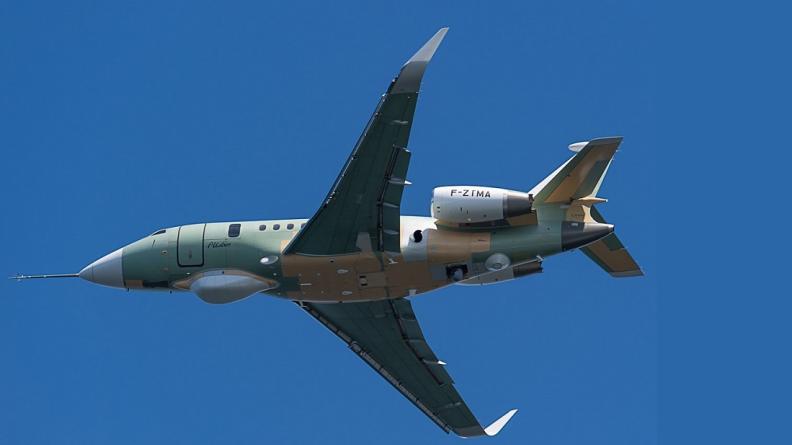
The French Direction Générale de l'Armement (DGA) has ordered 5 additional Dassault Aviation FALCON 2000 LXS ALBATROS maritime patrol aircraft, bringing the total AVISMAR programme to 12 platforms as France modernises its ageing maritime surveillance capabilities.
The contract notification on 26 September 2025 marks a significant milestone in France's efforts to maintain comprehensive maritime domain awareness across its vast territorial waters and exclusive economic zones spanning three oceans.
The AVISMAR (Avions de Surveillance et d'Intervention Maritime) programme originated from the pressing need to replace the French Navy's ageing fleet of maritime patrol aircraft. The service currently operates 8 FALCON 50M aircraft and 5 FALCON 200 GARDIAN platforms, based primarily in Morbihan on France's Atlantic coast and in the Pacific territories. These aircraft, which began their operational careers in the 1980s and 1990s, commenced retirement in 2025.
The programme's first phase saw the DGA order 7 aircraft in December 2020, with the inaugural ALBATROS completing its maiden flight on 24 January 2025. Flight testing and certification activities are currently underway at the DGA's flight test centre in Istres, supported by the organisation's test pilots and engineers. The programme targets initial operational capability by late 2026, providing French naval aviation with a modern surveillance platform.
France's maritime interests extend across approximately 11 million square kilometres of ocean, the second-largest maritime domain globally after the United States. This vast expanse encompasses waters in the Atlantic, Pacific, and Indian Oceans, as well as the Mediterranean Sea and Caribbean territories. The ALBATROS fleet will play a crucial role in safeguarding these waters, conducting missions ranging from territorial defence and sovereignty enforcement to search and rescue operations and disaster relief.
The aircraft will primarily support maritime surveillance, protection missions, and state action at sea - essential tasks in an era of geopolitical competition that adds to increasing maritime traffic, illegal fishing, drug trafficking, and environmental threats. The decision to base the ALBATROS on Dassault Aviation's proven FALCON 2000 LXS business jet is part of a pragmatic approach balancing operational requirements with budgetary constraints. This selection offers several strategic advantages. The civilian base platform provides mature, reliable airframe technology with excellent range and endurance characteristics. The FALCON 2000 LXS delivers greater operational radius compared to the retiring FALCON 50M and FALCON 200 GARDIAN, significantly expanding patrol coverage without requiring forward operating bases.
Importantly, the choice maintains France's industrial sovereignty in military aviation while leveraging civil aviation economies of scale. Dassault Aviation's expertise in adapting business jets for military missions - demonstrated previously with the FALCON 50M and Gardian programmes - ensures efficient platform militarisation. The contract sustains approximately 100 specialised jobs at Dassault focused on military conversions, preserving critical industrial capabilities.
As far as the aircraft is concerned, the ALBATROS represents a sophisticated sensor platform integrating French defence industry products. Its primary sensor suite comprises a Thales SEARCHMASTER active electronically scanned array (AESA) radar operating in X-band, providing maritime surveillance capabilities in all weather conditions. Complementing the radar, a Safran EUROFLIR 410 electro-optical/infrared turret delivers high-resolution imagery for target identification and tracking.
Naval Group developed the mission system integrating these sensors, reflecting cross-industry collaboration amongst France's leading defence contractors. The aircraft features advanced information superiority capabilities including satellite communications (SATCOM), enabling real-time intelligence sharing with naval vessels and command centres ashore.
For search and rescue missions, the ALBATROS carries a Search and Rescue beacon detector, lifeboat deployment system, and smoke marker dispensers. These capabilities prove essential when responding to maritime emergencies across France's expansive territorial waters, where commercial shipping and recreational vessels regularly require assistance.
The current twelve-aircraft order represents the programme's first phase, designed to fulfil all intervention requirements and a substantial portion of surveillance missions. However, France's maritime surveillance needs exceed the capacity of 12 crewed aircraft alone.
The programme might have a second phase to acquiring complementary systems, notably unmanned aerial vehicles, to achieve 100 per cent surveillance objectives – the original requirement envisaged as many as 18 ALBATROS. This integrated approach combining crewed and unmanned platforms would emphasise network-centric operations and persistent surveillance capabilities. Drones would likely handle routine patrol tasks, freeing the ALBATROS fleet for surge and complex missions requiring human decision-making and intervention capabilities.








